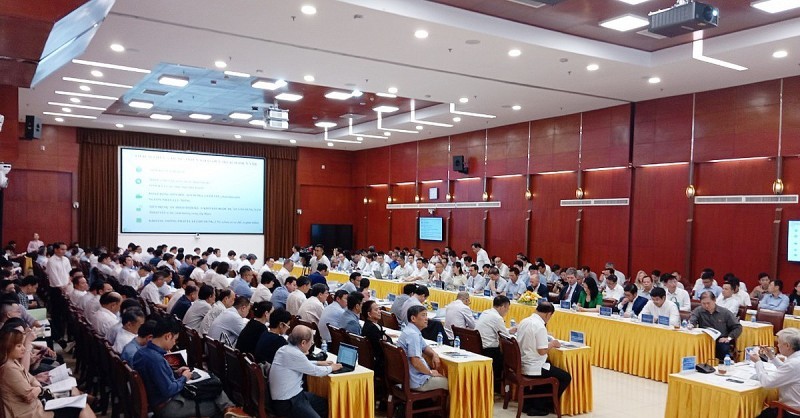Collecting opinions on the Petroleum Law (amended) before submitting it to the National Assembly for approval
15:15 | 05/08/2022
Mr. Nguyen Ngoc Bao - the Vice Chairman of the Economic Committee of NA, the draft law consists of 11 chapters and 64 articles, stipulating the petroleum basic investigation and activities within the mainland, islands and seas of the Socialist Republic of Vietnam.
Based on the opinions of NA deputies at the Third Session of the 15th National Assembly, the majority of National Assembly deputies and representatives of ministries and sectors attending the workshop agreed on the need to amend the Petroleum Law for institutionalizing the viewpoints of the Party and State; It is necessary to make mechanisms and policies for attracting investment and legal basis for promoting petroleum exploration in the coming period with many difficulties and to establish the new development foundation for ensuring the uniformity and synchronism of the legal system.
Recently, many new guidelines and policies on petroleum activities, so the bill should ensure the appropriate approach and mode of administration and state management related to petroleum activities for ensuring energy security, national defense security, economic privileges, sovereignty over sea and islands suitable with international commitments and practices and legalizing indispensable regulations in sub-law documents with ensuring unification in the legal system.
Mr. Pham Xuan Dung - Chairman of the Vietnam Union of Science and Technology Associations (VUSTA) considered that the Petroleum Law was promulgated in 1993, so far the Law arose many shortcomings and changes in implementing petroleum activities. In the coming time, the petroleum industry will still be a key economic sector in implementing industrialization and modernization associated with science, technology, and international relations. The petroleum activities with own specific characteristics and petroleum sector is a national asset with complex and high-risk technical specialties, low probability of exploration and search.
The economic, scientific and technical conditions are still limited in petroleum exploration, so it is necessary to cooperate with other countries.
At the workshop, PVN proposed to consider a number of contents that the bill stipulates the Ministry of Industry and Trade as the focal point to handle the basic petroleum investigation, but in implementing process there may arise some problems and inadequacies, such as, there are no specific regulations on handover of documents, samples and the report on basic investigation results and only handing these documents over to the Ministry of Industry and Trade and the Ministry of Natural Resources and Environment. The fact that PVN is not able to manage the documents, samples and basic survey results will lead to difficulties in using these survey results and not convenient for promotion, calling for investment, in-depth research.
PVN also made some specific proposals such as:
- The Petroleum contracts.
- Selecting the contractors providing goods and services for petroleum activities.
- Using petroleum information, data, documents, samples, projects and other assets installed and invested in expired petroleum contracts.
- Receiving fields, clusters of fields and lots from the contractors with the expiration of petroleum contracts.
- Cleaning up petroleum projects.
- Incentives in petroleum activities.
- Accounting, auditing, settlement for petroleum activities and handling expenses of PVN, etc.
Regarding the fulfillment of financial obligations from the turnover in selling petroleum products, the host country's interest in the petroleum contract before determining the interest to be distributed to the host country to pay the state budget, PVN leadership proposed to allow PVN to base on the host country's income for all petroleum contracts to pay expenses and obligations as a representative of the host country, or the costs in the role of supervising and maintaining petroleum contracts... (not handling separately for each contract) to ensure unification and synchronization in managing all petroleum contracts.
At the workshop, some opinions suggested that the amendment of the Law should create the best conditions to shorten the project implementation time, take advantage of the period when fossil energy demand is still high and the market and profitable. There were suggestions to review and evaluate more closely the groups of policies in the draft Law to ensure feasibility, synchronization and unification in the legal system.
There were also opinions that the Petroleum Law is amended in the context of complicated world geopolitics, so it is necessary to harmoniously handle political, diplomatic and economic relations in viewpoints of the Law orientations and design.
Besides, there were opinions that Vietnam has joined COP26 and committed net-zero emission level by 2050, so it is necessary to take full advantage of the advantages of the petroleum industry.
There were also opinions that the comprehensive amendment of the Petroleum Law is very timely to limit practical problems. These opinions suggested to closely and cautiously study for ensuring the feasibility and effectiveness, and limiting the obstacles in the Law implementation. At present, the rational exploitation and efficient use of the petroleum resources is absolutely necessary, the draft Law needs to continue to be perfected to create a full legal basis for managing and regulating very precious mineral resources.
After the representative of the Ministry of Industry and Trade received and explained the issues at the workshop, Mr. Nguyen Manh Hung - Standing Member of the National Assembly Economic Committee said that he will summarize the opinions and comments and report to the Economic Committee for consideration and study in the process of acquiring and revising the draft Petroleum Law (amended).




